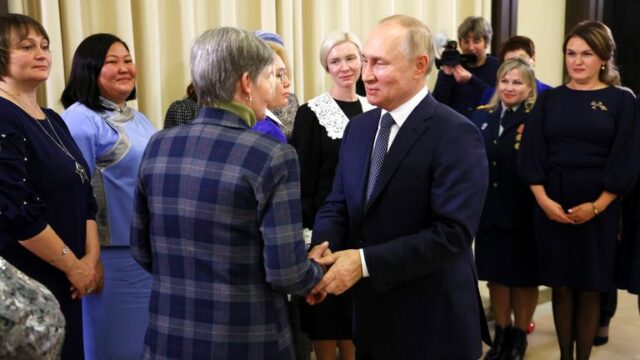
Putin’s Meeting With Mothers of the Mobilized
Publication: Eurasia Daily Monitor Volume: 19 Issue: 182
By:

On November 25, right before Russia’s observation of Mother’s Day, President Vladimir Putin met with women who were purportedly mothers of soldiers serving in the “special military operation” in Donbas. In a move not seen since the Russian president met with the mothers of those sailors who died in the Kursk submarine disaster in 2000, Putin expressed sympathy and shared the traditional view that mothers would always worry about their children (The Bell, November 29).
The meeting included mothers from 16 different parts of Russia, from “Chechnya and Tuva, Luhansk and Khakassia, Dagestan and the Moscow Region” (Vsko.ru, November 28). The fact that over half of the regions represented at the gathering belong to ethnic minorities speaks volumes about the soldiers’ origins. One of the mothers, Irina Viktorovna, asked for Putin’s attention to be devoted not to her own children but to those left without a home in the combat zone: “When new territories are liberated, there are a lot of street children, very many. I know that, of course, work is underway to find these children, to help them and their families and this, of course, should not be abandoned. It is necessary to strengthen assistance to these children.” Putin responded by pledging “to take some special measures related to the search for these children and their support” (Vsko.ru, November 28).
Described as a “bold step,” the meeting aimed to bolster Putin’s credibility in directly addressing the real experiences of those Russians taking part in the ongoing conflict in Ukraine. Accordingly, some have speculated that the experience and resulting political capital will be leveraged in his address to the Russian Federal Assembly before the end of 2022 (Ura.news, November 25).
The forum may also have functioned as a check on recruiting and equipment practices. As Russian Political Science Association Executive Director Igor Kuznetsov put it, “Not every leader of a state is capable of this given how much emotion, how much pain, how many hopes are in the hearts of mothers. It takes a certain amount of courage. Putin did not delegate this responsibility to anyone. It was important for him not only to support and reassure mothers but also to get important information first hand—how they perceive the service conditions of their children” (Ura.news, November 25).
Critics have suggested that the women were handpicked to avoid any embarrassing situations for Putin, and an interview with one of the mothers provides insight into these allegations (Pravda.com.ua, November 25). Irina Sumynina, a Cossack woman from the Kuban who has four sons (two of whom are involved in the fighting alongside their father), was one of the participants in the meeting with Putin. The very claim that Sumynina is a “Cossack woman” requires clarification, however, as this identifier has become predominantly masculine and the relative absence of women is one of the leading criticisms against the idea that the Cossacks (at least in their “registered” variety) constitute an ethnic group (Core.ac.uk, November 2, 2018).
Sumynina, who is originally from Tashkent, Uzbekistan, described the overwhelming enthusiasm of her 17-year-old son to go to the front and the assistance of the local Cossack community in calming him down. With a glimpse into Russian propaganda, she described how her husband distributed candy to children in the “liberated” territories and how “the Cossacks share their rations” (Vsko.ru, November 28). Tellingly, at one point in the interview, Sumynina revealed that “the Ataman of the Kuban voiska sent me to Moscow,” demonstrating that the participants in the meeting had been selected and therefore screened to ensure no direct confrontation with Putin. With many references to God in her interview, Sumynina reflected on the war: “To be invigorated, the Lord sends us such trials. But we can see them through. Although it hurts that young men are dying, the surviving elite bring forth their offspring and replenish the gene pool” (Vsko.ru, November 28).
While not an explicit endorsement of ethnic thinking—of which there is plenty of evidence in the post-Soviet Kuban Cossack voiska—such statements resonate with the ideas about war providing societal “hygiene,” popular before World War I. Given Putin’s invocation of the same “natural self-cleaning of society” brought about by the war, and the accusation that those who are not “mentally with Russia” believe they “belong to the higher caste, the higher race,” such details should not be ignored (Military.com, March 16). In line with the previous statements about ethnicity and an allusion to the position of the Schutzstaffel in Nazi Germany, Putin called the Cossacks a “special caste” on account of their service to Russia (Vsko.ru, November 28).
More generally, the use of Sumynina in the stage-managed meeting with the Russian president represents a further emboldening of the role of those Cossacks loyal to the Kremlin as “cheerleaders” in the conflict (see EDM, May 10). Not only does she represent women with numerous children who have seemingly devoted their lives to motherhood—a critical priority for Russia, which is facing a precipitous decline in its population, especially after the mass exodus provoked by the war and mobilization (see EDM, September 22, 27)—but she is also willing to provide Putin with some political capital in the form of vocal support for the war effort.
As the war continues and the human toll mounts, the Kremlin will be forced to react to public sentiment and reassure ordinary Russians that their sacrifices in Ukraine are not in vain. In this, as so much else, the registered Cossack movement will be extremely useful.



